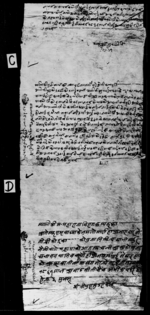A purjī from Jagatasiṃ Pāḍe Kṣetrī authorizing Viśnupada Upādhyā to continue recitations in the temple of Tripurasundarī in Tripurākoṭ (VS 1918)
ID: K_0093_0002C
Edited and
translated by Ramhari Timalsina
Created: 2021-02-17;
Last modified: 2021-05-03
For the metadata of the document, click here
The accompanying edition, translation/synopsis and/or commentary are available under the terms of the Creative Commons Attribution-ShareAlike 4.0 International License
Abstract
This purjī, issued as a deed of gift by Jagatasiṃ Pāḍe Kṣetrī, gives Viśnupada Upādhyā the authority to continue performing recitations at the Tripurasundarī temple located in Tripurākoṭ. As temple priest, the latter is obligated to recite the Caṇḍī 360 times, the Veda 9 times and the Tripurāsahasranāma 37 times.Diplomatic edition
[1r]
1श्रीत्रीपुरासुन्दरीदेवि2१1स्वस्तिश्रीगुठीजाच•का•जमादारजगतसींपाडेक्षेत्रीकस्यपुर्जि ¯ ¯ ¯ ¯ ¯ ¯ ¯ ¯ ¯ ¯
2आगेत्रीपुराकोट्दराकोटगाऊवस्न्या•थानीविश्नुपदउपाध्याके¯ ¯१¯कास्थान[...]
3म्राभाईछोरा•कानाऊमा•वेदचंडीपाठ•त्रीपुरा•सहश्रनामकोपाठलालमोहरमा[...]
4य़ावमोजिंको९सालदेषि१८सालतककोपाठकोआम्दानीषर्चवुझीअघी[...]
5चलीआय़ावमोजिंकोकत्तीनघटाईचलाऊनलाऊनुवाकीसेषकसरर[...]कोवु
6झील्याऊनूभंन्या•सव़ाललीहामीआईसवालवमोजिंआम्दानीषर्च[...][...]
7लमोहरवमोजीमचंडीपाठआव़र्त्ति३६०केव्यासतलीफालगाऊका[...]मध्ये
8पैसारुपैञाँ४५वेदआव़र्ति९केनीजगाऊका•ज्मामध्येपैसारुपैञाँत्रीपु
9रासहश्रनाम•पाठआवर्त्ति३७केगल्लीगाऊकाज्मामध्येपैसारुपैञाँ११
10दक्षीणाषानुभंन्यालालमोहरमा•दरीयाकोरहेछ•जाचवुझमा•कत्तीई
11पाठगरेकोठहर्दा•कसरकेहीननीस्कदासव़ालकोसलामीलीअघीदेषी[...]
12मोजिमकोपाठकत्तिनघटाईगर्नुपाठमादरीय़ाकागाऊवाटदछीणावु
13तीम्राहातवाटउठाईषानुभंन्यादानपत्रगरीदीञ्यूँइतीसम्वत्१९१८
14पौषसुदी१५रोज•४सुभम् ¯ ¯ ¯ ¯ ¯ ¯ ¯ ¯ ¯ ¯ 1सक्कलवमोजिंनक्कलदुरुस्तछभनीस्हीगर्ने
2रुद्रानंदपाध्यापु.वीश्नुपद१1स्हीविश्नुपदपाध्या1[Unknown seal] 1[Unknown seal]
Translation
[1r]
Śrī Tripurasundarī Devī (text: Trīpurāsundarī Devi) - 1
Hail! A purjī from Jagatasiṃ Pāḍe Kṣetrī, a Jamādāra of the Guṭhī Jā̃ca [Aḍḍā].
Āge: To Viśnupada Upādhyā, a local man of standing in Koṭa village [in] the Tripurākoṭ sub-division (darā)
We came to [Tripurākoṭ] with a savāla that states: ''Having collected the revenue and expenditures for reciting the Veda, Caṇḍī and Tripurāsahasranāma1 during the years [VS 190]9 to [19]18 at the temple of -1- (i.e., Tripurasundarī Devī), as stated in a lālamohara issued in the name of your kin2 , have the customary services continue without any diminution [in them], and take the surplus revenue (kasara) as yours." I have checked the revenue and expenditures in accordance with the savāla. It appears that the following is mentioned in the lālamohara [with you]: ''You shall enjoy as dakṣiṇā 45 rupees from what is collected from Vyāsatalī Phāla village for reciting the Caṇḍī 360 times, …3 rupees from what is collected from the same village for reciting the Veda 9 times and 11 rupees from what is collected from Gallī village for reciting the Tripurāsahasranāma 37 times. Upon inspection it is judged that all the recitations were made without any diminution and that no surplus revenue appeared. [Therefore], having received a levy (salāmī) relating to the savāla, I have issued a deed of gift (dānapatra) stating: "Continue without diminution the customary recitations and enjoy the dakṣiṇā collected from the specified villages, collecting the dakṣiṇā on your own (lit. ‘with your own hands’).”
Wednesday, the 15th of the bright fortnight of Pauṣa in the [Vikrama era] year 1918. Auspiciousness.
Attesting that the copy is in accordance with the original:
Rudrānaṃda Pādhyā Pu. Vīśnupada
Signature: Viśnupada Pādhyā
[Unknown seal]
[Unknown seal]
Commentary
It is apparent that a savāla was issued in or before VS 1918 instructing that the revenue and expenditures of the Tripurasundarī temple be checked. It was in compliance with the order that Jagatasiṃ Pāḍe Kṣetrī came and did the checking. A lālamohara issued in the name of Viśnupada Upādhyā's kin, and referred to in the present document, was reviewed by Kṣetrī during the checking.
The temple of Tripurasundarī referred to in the document is located on a hilltop of Tripurakot village development committee in Dolpa district. The expansion of the Gorkhā kingdom towards the west was considerably advanced during the regency of Bahadur Saha (1785-1794). Gorkhālī troops led by Kājī Śivanārāyaṇa Khatrī and Sardār Prabal Rāṇā made the first attack on Jumla in 1787, and within two years secured victory over the kingdom (Hamilton 1819: 287-88, Bajracharya 1992: 92-96). After the expansion, many documents were issued to regulate tax collection from the area. Apart from the present document there are a number of other documents preserved in Bhadrakālī (including K_0093_0002A–K_0093_0002Z, K_0093_0002D and K_0012_0027B) which relate to the management of the temple.

